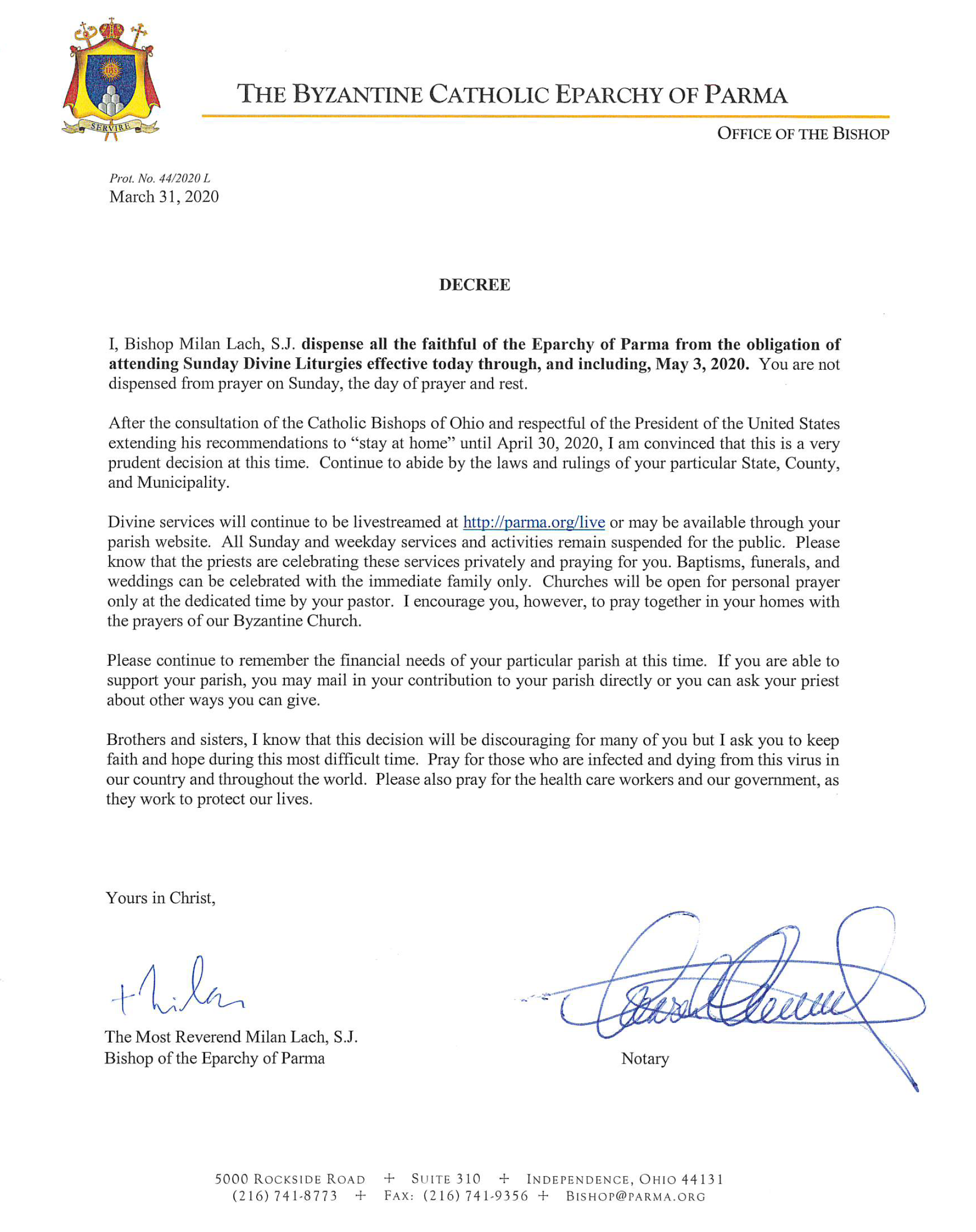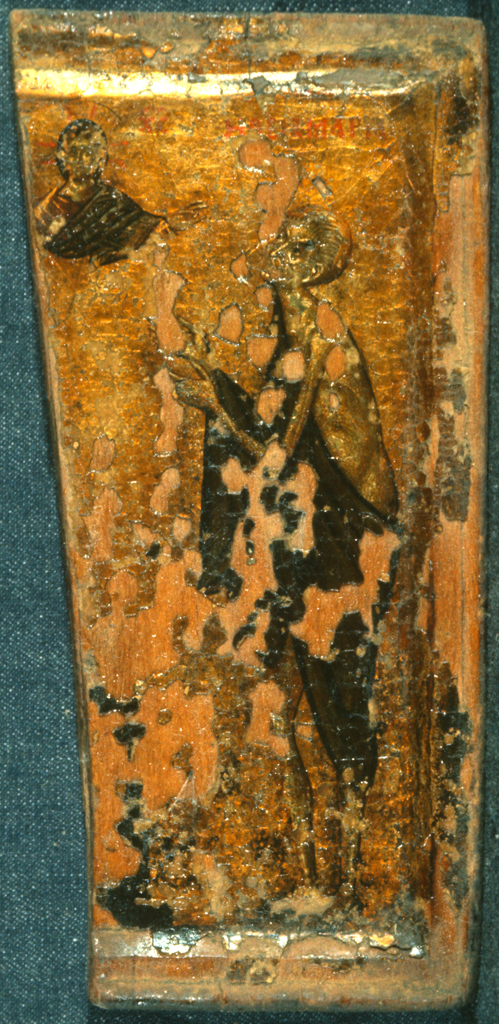“Lazarus! Come out!” So Jesus calls to his friend who has died, over whom he has wept, and who has been four days in the tomb. St. Cyril of Jerusalem points out, “One day had passed, and a second, and a third: his sinews were decayed, and corruption was preying already upon his body.” And yet Lazarus does come out, still wearing his grave clothes, but as alive and well as you or me.
When the One Who, in the beginning, speaks life into being tells one of us, his creatures, to live, though we lie in a tomb, we will live. Whether we have been dead four days, like Lazarus, or four thousand years, we will heed this command of our master. When the one who made us out of dust tells us to arise, though our bodies have turned to dust, they will arise. Dust cannot resist the divine word at resurrection time.
The resurrection of Lazarus was yesterday and the resurrection of Jesus is next Sunday. Between these two resurrections is today and Holy Week. Today, Palm Sunday, is inextricably linked to yesterday, Lazarus Saturday. Liturgically, they form a unit all their own, between the Great Fast and Holy Week. So, though we rightly call today Palm Sunday in commemoration of Christ’s triumphant entry into Jerusalem as King and Messiah, let’s not forget the place of Lazarus in all of this, who appears at the beginning, the middle, and the end of today’s gospel.
The gospel begins with Lazarus, who had been dead, eating supper with Jesus and his disciples. This is one of the signs of the resurrection of the body. Only a truly embodied person eats food. Jesus will repeat this sign after his own resurrection, when he will eat broiled fish with his disciples in Jerusalem (Luke 24:42). By this sign, we know that Lazarus and Jesus are truly risen in the body and not merely ghosts or visions.
And then, in the middle of the gospel, we learn of a further connection between Jesus and Lazarus. Not only are the chief priests now plotting to put Jesus to death, but also Lazarus, “because, on account of him many of the Jews were going away and believing in Jesus.”
According to tradition, Lazarus, unlike Jesus, escapes their plot. He lives on another thirty years. When he dies a second time, they lay him in a sarcophagus on which they write, “Lazarus of the four days and the friend of Christ.” For four days, Lazarus knew death, which no one else among the living has ever known. The Synaxarion says he never spoke of it and some say he never laughed again until he saw a man stealing a clay pot. And then he laughed, saying, “One earth steals another.”
And then at the end of today’s gospel, after Jesus’ triumphant entry into Jerusalem, we learn why the great crowd is so exultant and why they hail Jesus as their king: because he has raised Lazarus. This miracle more than all the others convinces multitudes that Jesus is the Christ. By raising Lazarus, Jesus shows that he can raise us all and that he will save us – even from the last enemy, even from death. This divine triumph even over death is the sign that brought so many to belief in Jesus.
And this belief of the people is what motivates the Pharisees and chief priests to take action against Jesus. They see that, due to this great sign, many are believing in Jesus and they fear that this will provoke the Romans to come and destroy them. The high priest Caiaphas, though motivated by cowardice, unintentionally prophesies, saying, “It is expedient for you that one man should die for the people, and that the whole nation should not perish” (John 11:50). And so, (in the gospel according to John), they plot to put Jesus to death as a direct result of his resurrection of Lazarus.
Jesus’ resurrection of Lazarus leads today to his triumphant entry into Jerusalem – but it will soon lead also to his death. Quite directly, Jesus lays down his own life in exchange for giving life to his friend Lazarus. There is no greater love. Ultimately, Jesus lays down his life to give life to us all. It is good to be a friend of Christ Jesus. Even though you die, he will give you life.
Today, we sing again the Troparion of Lazarus from yesterday:
Christ our God, before your passion you confirmed our common resurrection when you raised Lazarus from the dead. Therefore, like the children, we carry the symbols of victory and cry out to you, the Victor over death: Hosanna in the highest! Blessed is he who comes in the name of the Lord.
I believe that, through Lazarus, Jesus has something to teach us about death. (Now the remembrance of death is being put daily before our eyes, even by the media. As Christians, we should always remember that we are going to die). When Lazarus dies, Jesus weeps. And then, he raises Lazarus from the dead. This is our perfect model for how to approach death.
First, death is an occasion for weeping. It is a sorrowful thing. It is a terrible thing. It is an unnatural thing. It is the last enemy. It is not a natural part of life. It is not “going to a better place.” It is a thing to be lamented. It is a thing to put an end to.
Nevertheless, for each of us there is a time to die (Eccl. 3). For Lazarus, there are two times to die. And for Jesus, there is a time to die. The death of Jesus is like no other, because he alone is Life. And so death cannot keep him in his clutches. When life enters into death, it is death that dies at last.
Loretta Lynn sings, “Everybody wants to go to heaven, but nobody wants to die.” And that’s mostly right, and for good reason. Jesus did not want to die. And he wept again when his time for death drew near to him in Gethsemane. “In the days of his flesh, Jesus offered up prayers and supplications, with loud cries and tears, to him who was able to save him from death, and he was heard for his godly fear.” (Heb 5:7).
So in the face of death, first we weep, as Jesus weeps, and then, after our weeping, we accept death, and then, on the other side of that gaping chasm of Hades, there is hope, because Jesus, the way and the life, has gone there first. In him, there will be a restoration of all things to right. After death, there comes a better life with the resurrection. It is not better for us to be dead. It is not better for our souls to be “freed” from our bodies. It is better for us to rise in Christ and live again in bodies freed from mortality. So, yes, we grieve in the face of death, but we do
not grieve as others do who have no hope. For since we believe that Jesus died and rose again, even so, through Jesus, God will bring with him those who have fallen asleep…. For the Lord himself will descend from heaven with a cry of command, with the archangel’s call, and with the sound of the trumpet of God. And the dead in Christ will rise first… and so we shall always be with the Lord. Therefore comfort one another with these words (1Th 4:13-18).
God knows we need comfort in these days.



